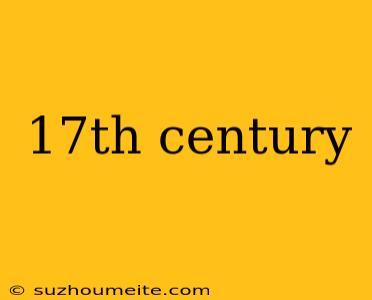The 17th Century: A Time of Great Change and Discovery
The 17th century, spanning from 1601 to 1700, was a time of significant transformation and growth in various aspects of human life. This era witnessed major advancements in science, technology, art, and politics, setting the stage for the modern world.
The Scientific Revolution
The 17th century is often referred to as the Golden Age of Science. This period saw the emergence of prominent scientists who challenged traditional thinking and made groundbreaking discoveries. Some notable figures include:
Galileo Galilei
- Galileo's Telescope: In 1608, Galileo invented the first practical telescope, allowing humans to study the heavens with unprecedented accuracy.
- Challenging Aristotelian Views: Galileo's observations of the heavens contradicted Aristotelian views, paving the way for the acceptance of the Copernican heliocentric model.
Isaac Newton
- Laws of Motion: In 1687, Newton published his laws of motion, which described the fundamental principles governing the natural world.
- Universal Gravitation: Newton's law of universal gravitation explained the force that governs the motion of celestial bodies.
The Age of Exploration and Colonization
The 17th century was marked by European exploration and colonization of the Americas, Africa, and Asia. This led to:
The Establishment of Colonial Empires
- The Dutch East India Company: Founded in 1602, this company played a significant role in Dutch colonization and trade in Asia.
- The English Colonization of North America: The establishment of Jamestown in 1607 marked the beginning of English colonization in North America.
The Rise of Global Trade
- The Dutch Golden Age: The Netherlands experienced significant economic growth, becoming a major trade hub and colonial power.
- The English Navigation Act: Passed in 1651, this act protected English shipping and established a monopoly on trade.
Artistic and Cultural Achievements
The 17th century was a time of great artistic and cultural expression, marked by:
Baroque Art and Architecture
- Characteristics: Grandiose, ornate, and emotive, Baroque art and architecture dominated the period.
- Notable Artists: Caravaggio, Rembrandt, and Vermeer were among the prominent artists of the time.
The Emergence of Opera
- First Public Opera: In 1637, the first public opera, "Andromeda," was performed in Venice, Italy.
- Notable Composers: Claudio Monteverdi and Heinrich Schütz were prominent opera composers of the era.
Conclusion
The 17th century was a transformative period, marked by significant advancements in science, exploration, art, and politics. The discoveries and achievements of this era laid the groundwork for the modern world, shaping the course of human history.
